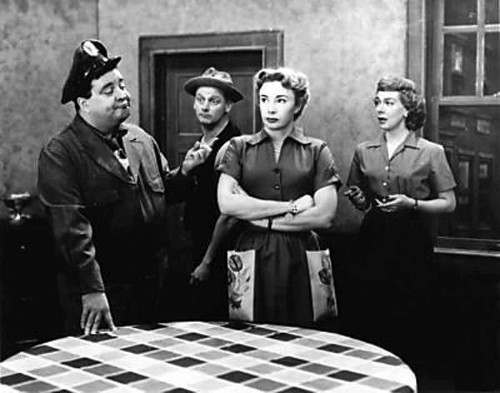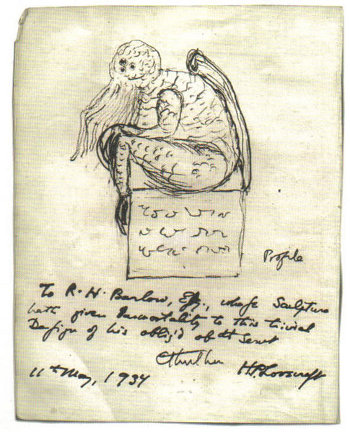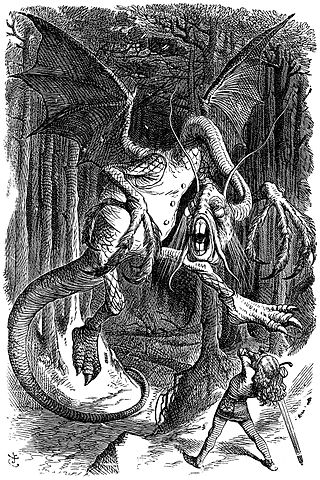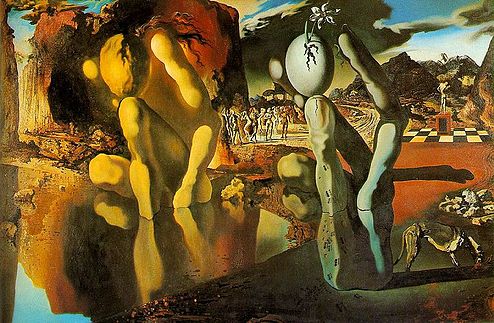
Jackie Gleason
Was not exactly the voice of reason.
— Louis Phillips

Jackie Gleason
Was not exactly the voice of reason.
— Louis Phillips

H.P. Lovecraft’s cosmic horror tales describe a world that’s literally beyond human understanding — his characters glimpse a universe ruled by monstrous gods whose very aspect imperils our sanity.
For his 2011 experimental poem Cthulhu on Lesbos, David Jalajel reflected this by taking phrases from Lovecraft’s 1928 story “The Call of Cthulhu” and arranging them into Sapphic stanzas without regard to conventional syntax:
Dark to visit faithful But Great had ever
Old The carven idol was great Cthulhu,
None might say or others were like the old but
Things were by word of
Mouth. The chanted secret — was never spoken
Only whispered. chant “In his house at R’lyeh
Dead Cthulhu waits of the found be hanged, and
Rest were committed
It ends, fittingly, on a fearsome but enigmatic note:
Prance and slay around in by sinking black else
World by now be screaming with fright and frenzy.
Knows the end? has risen may sink, and sunk may
Rise. and in deep, and
The wayfarer,
Perceiving the pathway to truth,
Was struck with astonishment.
It was thickly overgrown with weeds.
“Ha,” he said,
“I see that none has passed here
In a long time.”
Later he saw that each weed
Was a singular knife.
“Well,” he mumbled at last,
“Doubtless there are other roads.”
— Stephen Crane
This poem’s title is Untitled —
Not because it is untitled,
But because I am entitled
To entitle it Untitled.
If I’d not titled it Untitled,
It would truly be untitled …
Which would make me unentitled
To entitle it Untitled.
So it is vital, if untitled,
Not to title it Untitled,
And to leave that title idled,
As a title is entitled.
— Kenneth Leonhardt
I think of my wife’s penmanship as a race
Of dwarves drowning in a cursive swamp, or
Lost, hands waving, as consonants rush face
To face into unmitigated vowels. On the door
To our refrigerator one early morning note, or
A map of Tasmania with spasmodic X’s
Which might mean kisses or malfunctioning T’s.
Oh, Momma, Momma, why didn’t you warn me:
“Never marry a woman whose handwriting
You cannot read.” Full-blown capital R’s
Turned on their sides. My wife has either
Run off with the plumber (or is it carpenter?)
To inaugurate correspondences from Paris,
Or she wishes me to purchase for supper
Hornet butter, three pounds of javelins, and/or
One large rat to stab behind the arras.
Am I holding her message upside down? Possibly.
Now I shall suffer in suspense all day until night
To discover the full-mouthed truth of her scrawl.
— Louis Phillips

“Jabberwocky” works wonderfully in German — writer Thomas Chatterton offered this translation to Macmillan’s Magazine in 1872:
Es brillig war. Die schlichte Toven
Wirrten und wimmelten in Waben;
Und aller-mümsige Burggoven
Die mohmen Räth’ ausgraben.
»Bewahre doch vor Jammerwoch!
Die Zähne knirschen, Krallen kratzen!
Bewahr’ vor Jubjub-Vogel, vor
Frumiösen Banderschnätzchen!«
Er griff sein vorpals Schwertchen zu,
Er suchte lang das manchsam’ Ding;
Dann, stehend unten Tumtum Baum,
Er an-zu-denken-fing.
Als stand er tief in Andacht auf,
Des Jammerwochen’s Augen-feuer
Durch tulgen Wald mit wiffek kam
Ein burbelnd Ungeheuer!
Eins, Zwei! Eins, Zwei! Und durch und durch
Sein vorpals Schwert zerschnifer-schnück,
Da blieb es todt! Er, Kopf in Hand,
Geläumfig zog zurück.
»Und schlugst Du ja den Jammerwoch?
Umarme mich, mien Böhm’sches Kind!
O Freuden-Tag! O Halloo-Schlag!«
Er chortelt froh-gesinnt.
Es brillig war. Die schlichte Toven
Wirrten und wimmelten in Waben;
Und aller-mümsige Burggoven
Die mohmen Räth’ ausgraben.
In The Philosopher’s Alice, Peter Heath calls this “easily the best” of the poem’s many translations. “In no other language is elaboration of structure so readily compatible with entire absence of meaning.”

Oh who that ever lived and loved
Can look upon an egg unmoved?
The egg it is the source of all,
‘Tis everyone’s ancestral hall.
The bravest chief that ever fought,
The lowest thief that e’er was caught,
The harlot’s lip, the maiden’s leg,
They each and all come from an egg.
The rocks that once by ocean’s surge
Beheld the first of eggs emerge —
Obscure, defenseless, small and cold —
They little knew what egg could hold.
The gifts the reverent Magi gave,
Pandora’s box, Aladdin’s cave,
Wars, loves, and kingdoms, heaven and hell
All lay within that tiny shell.
Oh, join me gentlemen, I beg,
In honoring our friend, the egg.
— Clarence Day, Scenes From the Mesozoic, 1935

On the pale yellow sands
Where the Unicorn stands
And the Eggs are preparing for Tea
Sing Forty
Sing Thirty
Sing Three.
On the pale yellow sands
There’s a pair of Clasped Hands
And an Eyeball entangled with string
(Sing Forty
Sing Fifty
Sing Three.)
And a Bicycle Seat
And a Plate of Raw Meat
And a Thing that is hardly a Thing.
On the pale yellow sands
There stands
A Commode
That has nothing to do with the case.
Sing Eighty
Sing Ninety
Sing Three.
On the pale yellow sands
There’s a Dorian Mode
And a Temple all covered with Lace
And a Gothic Erection of Urgent Demands
On the Patience of You and of Me.
— Lord Berners

From a point P, drop perpendiculars to the sides of a surrounding triangle. This defines three points; connect those to make a new triangle and drop perpendiculars to its sides. If you continue in this way, the fourth triangle will be similar to the original one.
In 1947, Mary Pedoe memorialized this fact with a poem:
Begin with any point called P
(That all-too-common name for points),
Whence, on three-sided ABC
We drop, to make right-angled joints,
Three several plumb-lines, whence ’tis clear
A new triangle should appear.
A ghostly Phoenix on its nest
Brooding a chick among the ashes,
ABC bears within its breast
A younger ABC (with dashes):
A figure destined, not to burn,
But to be dropped on in its turn.
By going through these motions thrice
We fashion two triangles more,
And call them ABC (dashed twice)
And thrice bedashed, but now we score
A chick indeed! Cry gully, gully!
(One moment! I’ll explain more fully.)
The fourth triangle ABC,
Though decadently small in size,
Presents a form that perfectly
Resembles, e’en to casual eyes
Its first progenitor. They are
In strict proportion similar.
The property generalizes: Not only is the third “pedal triangle” of a triangle similar to the original triangle, but the nth “pedal n-gon” of an n-gon is similar to the original n-gon.
Drear fiend: How shall this spay be dent?
I jell you no toque — I do not know.
What can I do but snatch the woe
that falls beyond my pane, and blench
my crows and ted my briny shears?
Now galls another class. I’ll sit
and eye the corm that’s fought in it.
Maces will I fake, and heart my pare.
Is this that sold elf that once I was
with lapped chips and tolling lung?
I hollow sward and tight my bung
for very shame, and yet no cause —
save that the beery witchery
of Life stows grail. Shall I abroad?
Track up my punks? Oh gray to pod
for him who sanders on the wee!
I’ll buff a stag with shiny torts
and soulful hocks, a truthbush too,
perhaps a rook to bead — but no!
my wishes must be dashed. Reports
of danger shake the reaming scare.
Whack against blight! Again that tune,
“A gritty pearl is just like a titty prune”
blows from the fox. I canot bear
this sweetness. Silence is best. I mat
my mistress and my sleazy lumber.
I’ll shake off my toes, for they encumber.
What if I tub my stow? The newt
goes better fakèd to the cot.
I’ll hash my wands or shake a tower,
(a rug of slum? a whiskey sour?)
water my pants in all their plots,
slob a male hairy before I seep —
and dropping each Id on heavy lie,
with none to sing me lullaby,
slop off to dreep, slop off to dreep.
— Robert Morse, quoted in W.H. Auden’s commonplace book A Certain World